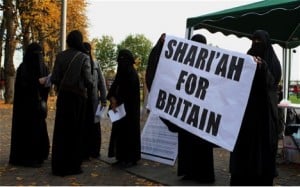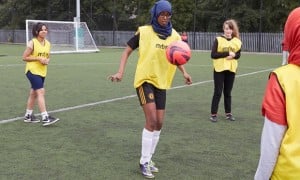Recently, BBC’s Sporting Witness and NPR’s Tell Me More featured interviews with prominent Muslimah athletes. Sporting Witness profiled Hassiba Boulmerka— otherwise known as the “Constantine Gazelle”—an Algerian Olympic gold medal winner in the 1500m competition in 1992. In the United States, Tell Me More profiled American fencer Ibtihaj Muhammad, who’s currently training for the 2012 Summer Olympics in the saber competition (she is currently ranked second in the United States).

What struck me, listening to both of the interviews, were both Boulmerka and Muhammad’s personal reflections of how their clothing choices influenced or affected their athletic participation. This is something that I know many of my Muslim (and even non-Muslim) sisters and I have grappled with—how do we maintain our own physical activity while dressing in a way that we are personally comfortable with (for both hijabis and non-hijabis alike)?
Boulmerka did not wear hijab and was unable to train for the Olympics in Algeria due to the death threats she received as a result of her decision to compete publicly; she was deemed “anti-Islam” by local clerics following her win at the World Championships in 1991:
It was Friday prayers and the imam said I was not a Muslim. That I did not represent Muslims. And that I was anti-Islam because of the fact that I’d run in shorts and shown my legs and arms. It wasn’t just that I wasn’t a Muslim, it was that I was anti-Islam. That’s how it all began.
The NPR piece focuses on the “Olympic Hopeful: Mixing Faith and Fencing,” highlighting how she might be the first Muslim American woman to compete in an Olympic competition (during Ramadan this year) while wearing hijab. Muhammad participated in a variety of different athletic activities before settling on fencing:
As a practicing Muslim woman, I knew that I would not only have to find a sport that accommodated my religious beliefs, but also where I could be fully covered and not have to change the uniform.

Boulmerka and Muhammad’s interviews illuminate how radically different their training, political contexts, and clothing choices were. While her clothing choices seemed to have little influence on her running competitively, Boulmerka faced political vitriol and required an armed guard at the Olympics because she wore a traditional track outfit. Muhammad settled on fencing, in part because the clothing requirements would easily allow her to maintain her own personal comfort and align with her religious beliefs. Both of the interviews are insightful and allow each woman to voice her beliefs and reasons for competing on her own terms.
In media profiles of Muslim women, there is oftentimes an overemphasis of women’s decision to wear or not wear hijab, with little discussion of women’s own complex, personal beliefs regarding their clothing and the social ramifications they face as a result of their decisions in their own words. Muslim women who do not wear hijab may not receive the same media attention as hijab-wearing sisters, and hijab-wearing women often have to constantly discuss the hijab with little discussion of anything else.
In 2008, MMW analyzed the way Muslimah athletes competing in the Beijing Olympics were portrayed by media outlets. I’m surprised by the emphasis on Muslim-majority countries who had women competing for the first time in 2008, knowing now about Boulmerka’s win for Algeria in 1992. I’m not surprised by the media focus on their clothing decisions, and lack of discussion of Muslim women who participate without wearing hijab.
The lack of nuanced discussion and honest reflection of Muslim women athletes—hijabi and non-hijabi alike—in the media leads some commentators to erroneous conclusions regarding women’s ability to participate in athletic events from a religious standpoint. An analysis of Muslim women competing at the Beijing Olympics by Gender Across Borders in 2009 contained the following verdict:
Why are there few Muslim women participating in sports? Physical activity conducted within the framework of the Quran involves three major issues having to do with women participation in sports: sex segregation, modest uniform, and abstinence from vigorous activity during periods of religious fasting. But that does not prohibit all Muslim women from being involved in sports.
Conclusions like these do not allow Muslim women to discuss their beliefs on their own, and blatantly disregard how Muslim women indeed do participate in physical activity for their well-being both here and abroad in a way that they are comfortable with (as opposed to what the commentator is familiar with and bafflingly associates with Islamic religious belief).
Hopefully there will continue to be an increase in Muslim women competing at the Olympics, and serve to inspire girls and woman in their own athletic achievement—and on their own terms—for their well-being. In an interview in the Wall Street Journal from last summer, Muhammad says:
I’d love for other minority women and religious minorities [in the U.S.] to believe they can excel in something outside the norm—not just sports, anything where they’re breaking the barrier…and not be deterred by what the image is just because they fall outside that box.
And Boulmerka says about her win:
It showed that you should fight for things. That you should have courage.













